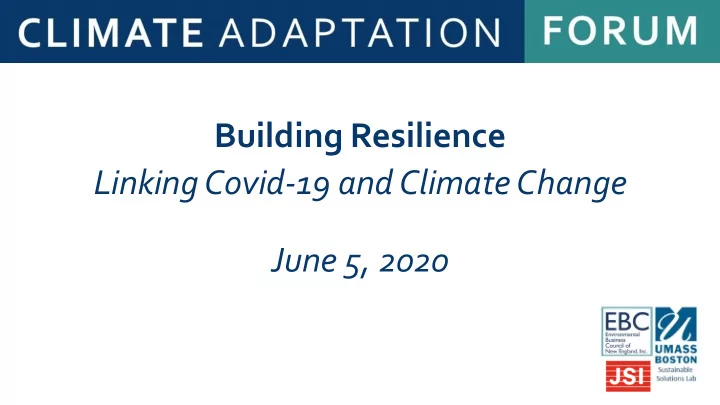

Building Resilience Linking Covid-19 and Climate Change June 5, 2020
Covid-19, Climate Change, and the Challenges of a Slow Roll Crisis Georges C. Benjamin, MD Executive Director American Public Health Association Sustainable Quarterly Climate Adaptation Forum | June 5, 2020 Solutions Lab
Climate Adaption Forum Building Resilience: Linking Covid-19 and Climate Change COVID-19 Co-Disaster Planning & Response June 5, 2020 Georges C. Benjamin, MD, MACP, FACEP(E), FNAPA Executive Director Secretary, Executive Board
COVID-19/NOVEL CORONAVIRUS
COVID-19/NOVEL CORONAVIRUS World Pandemic As of 10:30 a.m. ET June 4, 2020
U.S. E .S. Experience T xperience To Da o Date te 1.9 Million cases 110,000 deaths 6/5/2020
COVID CO VID-19/N 19/NOVEL VEL CO CORON ONAVIR VIRUS US There Are 3 Epidemics • COVID-19 – Emerging Infectious Disease • Infodemic – Misinformation & Disinformation • Epidemic of Fear – Fear of the unknown – Misstatements & poor risk communication – A rapidly moving communication environment – Mismanagement by some policy makers & loss of trust
COVID-19/NOVEL CORONAVIRUS Family of Coronavirus
COVID-19/NOVEL CORONAVIRUS
COVID-19/NOVEL CORONAVIRUS Epidemiological To Date • Each person can infect at least 2 other people – More infectious than most influenza strains • 80% of cases have mild symptoms & 15-20% severe • Case fatality rate 1.4% - 3.4%, but falling • Lots of other complications other than pulmonary disease (Strokes, clots, immune dysfunction, etc.) • Community transmission actively occurring in the U.S. – Asymptomatic transmission ~25%
COVID-19/NOVEL CORONAVIRUS How Is It Transmitted
COVID-19/NOVEL CORONAVIRUS COVID-19 Health Disparities US Demographics Whites – 60% Black – 12% Hispanic – 18% CDC, Hospitalized patients
COVID-19/NOVEL CORONAVIRUS Nonpharmacological Interventions (NPI) • Handwashing • Respiratory etiquette • Physical (Social) distancing • Travel restrictions • Selective closure of large events & gatherings, non-essential business, schools, places of worship • The use of facial masks / coverings
COVID-19/NOVEL CORONAVIRUS Nonpharmacological Interventions (NPI)
Co Co-Disaster Disaster Planning Planning
Clima Climate te Chan Change ge
Ex Extr treme He eme Heat
Se Sever ere S e Stor torms: Hur ms: Hurricanes, ricanes, Rain, Rain, Floods loods, & T , & Tor ornadoes nadoes
Wildfir ildfires es & & Toxic Air xic Air
Infr Infrastr astructur ucture e Failur ailure Michigan Edenville Dam Failure, May 19, 2020
Pr Prote otest st Spur Spur Risk Risk of of Disea Disease se Spik Spikes es
New Ne w Plann Planning ing Consider Co nsiderations tions • NPI difficult to do in most disaster response scenarios – Physical distancing – Masking – Handwashing • Competition for Resources • Multiple health risks – Air quality changes exacerbate COVID-19 lung disease – Injury, contagion, mental health, water borne, etc. • Communication – Infodemics undermine response communication – Mixed messaging • National Capacity to manage multiple disasters
Shelter Shelters s Not D Not Designed esigned For or Phys Physical ical Dis Distan tancing cing
COVID-19/NOVEL CORONAVIRUS Cotton Mask
Handwashing
Testing
Cont Contact act Tracing acing
Suppl Supply y Line Line Challeng Challenges es
Inf Infodemic odemic
Managing Mana ging Multiple Multiple Ev Events ents COVID-19 Climate Change Others Events
Dis Discussion cussion
About APHA APHA is a global community of public health professionals and the collective voice for the health of the public. APHA is the only organization that combines 140 years of perspective, a broad-based constituency and the ability to influence federal policy to advocate for and improve the public’s health. Founded – April 18, 1872 ● 501C(3) & Nonpartisan ● Over 50,000 individual & affiliate members ●
Recommend
More recommend